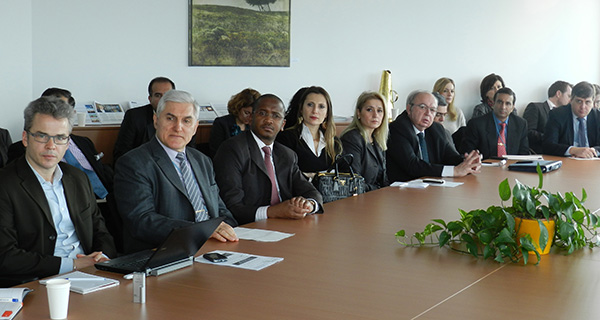
The Vienna Center for Disarmament and Non-Proliferation (VCDNP) and the James Martin Center for Nonproliferation Studies (CNS) held their seventh intensive short course on Nuclear Non-Proliferation and Disarmament on 17-21 March 2014. The continued high demand and interest for the course brought a mix of twenty-five diplomats and officials from international organizations and government agencies to the VCDNP office in Vienna, Austria. Participants represented twenty-three states from Africa, Asia, the Middle East, South America, and Europe. Ten of the twenty-five participants were women.

The course covered key issues related to the nuclear non-proliferation regime, including the history and current status of the Treaty on the Non-Proliferation of Nuclear Weapons (NPT); an overview of the International Atomic Energy Agency (IAEA) and implementation of IAEA safeguards; verification techniques; nuclear arms control and disarmament, and other topics. The course concluded with a tour of the IAEA safeguards laboratories and the satellite imagery facility at the Vienna International Center.
The timing of the March 2014 course program was particularly prescient, convening just prior to both the Nuclear Security Summit in The Hague (24-25 March) and the third NPT Preparatory Committee (PrepCom) meeting in New York (28 April - 9 May). With these significant meetings just on the horizon, expert lecturers dedicated a half-day to discussing nuclear security topics and providing background on the Nuclear Security Summits. Course participants also devoted substantial time to the NPT, its review process, and were able to benefit from a panel discussion on the third NPT PrepCom meeting with the chairman designate of the third session Ambassador Enrique Roman-Morey (Peru), Ambassador Luis Alfonso de Alba (Mexico), and Ambassador Alexander Kmentt (Austria), moderated by Dr. William Potter (CNS). The panelists discussed the agenda items for the upcoming PrepCom meeting and provided their views on what they believe to be the most important issues.
Participants were also given the opportunity to engage in a special guest lecture on the humanitarian consequences approach to nuclear disarmament initiatives by Dr. Rebecca Johnson, FRSA, director of the Acronym Institute for Disarmament Diplomacy and co-chair of the International Campaign to Abolish Nuclear Weapons (ICAN). This timely lecture discussed the need to highlight the human security dimension of the impact of nuclear weapons and gave further insight into the Second International Conference on the Humanitarian Impact of Nuclear Weapons held in Nayarit, Mexico, in February 2014.
Course lecturers included CNS and VCDNP staff members as well as senior experts from international non-proliferation organizations, including the IAEA and the Preparatory Commission for the Comprehensive Nuclear-Test-Ban Treaty Organization (CTBTO). The list of speakers included: Jill Cooley (IAEA), Jean Du Preez (CTBTO), Daniel Feakes (OPCW), Trevor Findlay (Belfer Center, Harvard University), Robert Kelley (IAEA Safeguards (ret.)), Khammar Mrabit (IAEA), Gaukhar Mukhatzhanova (CNS), Dr. William Potter (CNS), Tariq Rauf (Stockholm International Peace Research Institute), Dr. Thomas Shea (ThomSheaNuclear Consulting Services), Dr. Nikolai Sokov (VCDNP), and Elena Sokova (VCDNP).
At the end of the course, participants completed an anonymous survey aimed at assessing the course and its contribution to their professional development. The following are some of the assessments provided by participants (quoted as written):
The VCDNP extends its gratitude to the Carnegie Corporation of New York, the Federal Ministry for Europe, Integration and Foreign Affairs of Austria, and the Ministry of Foreign Affairs of the Kingdom of the Netherlands for their generous support that made this course possible.


